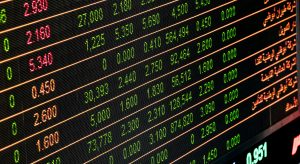Economy and Finance
82 The Internet and The Stock Market
Kaitlyn Tillery

Introduction
The invention of the internet has changed stock trading by making it easier for everyone to access financial markets, get real-time information, and use advanced trading tools, which has transformed global finance. The revolution in stock trading driven by the internet is an example of how science and technology can reshape society, enhance accessibility, and drive global economic growth.
Connection to STS
The internet’s impact on stock trading is a good example of how science, technology, and society are connected. STS looks at how new technologies change society and how society also has an influence on technology. The internet made stock trading easier and more accessible for everyone, not just professionals. This change shows how technology can open up new opportunities but also bring new challenges into an industry.
Increased Accessibility
Prior to the 1990’s, an estimated one third of households owned stock in the stock market. Before the internet, stock trading was done mostly by professional brokers and wealthy individuals. The process was cumbersome, requiring phone calls and physical paperwork. The internet greatly expanded access to stock markets, allowing anyone with an internet connection to trade stocks. Online brokerage platforms emerged, offering user-friendly interfaces and lower fees, making it easier for investors to participate in the market. (Bogan 2008)
Real-Time Information
The internet has made real-time information readily available to traders. News, financial reports, and market data can be accessed instantly, enabling traders to make informed decisions quickly. This has led to more dynamic and responsive trading environments, where prices can fluctuate rapidly based on the latest information.
Automated Trading and Algorithms
The internet has also facilitated the development of automated trading systems and algorithms. High-frequency trading (HFT) uses complex algorithms to execute trades at speeds and volumes that are impossible for human traders. These systems can analyze vast amounts of data and execute trades in milliseconds, significantly impacting market behavior and volatility. (Chen 2024)
AI in trading
AI algorithms are able to analyze vast amounts of data at unprecedented speeds, identifying patterns and trends that human traders might miss. This capability allows for more informed decision-making and the development of more sophisticated trading strategies. Additionally, AI-driven trading systems can execute trades at optimal times, reducing the impact of human emotions and biases. The rise of AI however, has raised concerns regarding the need for more regulations on its use in the stock market. (Powers 2024)
Social Trading and Communities
Social media and online communities have created new ways for traders to share information and strategies. Platforms like Twitter, Reddit, and specialized trading forums allow traders to discuss market trends, share tips, and even coordinate trading activities. Stocks now experience significant price movements based on social media trends.
Challenges and Risks
While the internet has brought many benefits to stock trading, it has also introduced new challenges and risks. The speed and ease of online trading can lead to impulsive decisions and increased market volatility. Additionally, the anonymity of the internet can facilitate fraudulent activities. Traders must be vigilant and conduct thorough research to avoid falling victim to scams.
Conclusion
The internet has fundamentally transformed stock trading, making it more accessible, fast-paced, and interconnected. While these changes have opened up new opportunities for traders, they also require a greater level of awareness and caution. As technology continues to evolve, the landscape of stock trading will undoubtedly continue to change, presenting both new challenges and opportunities.
References
Bogan, V. (2008). Stock Market Participation and the Internet. The Journal of Financial and Quantitative Analysis, 43(1), 191–211. http://www.jstor.org/stable/27647344
Barber, Brad, M., and Terrance Odean. (2001). The Internet and the Investor. Journal of Economic Perspectives, 15 (1): 41–54. https://pubs.aeaweb.org/doi/pdf/10.1257/jep.15.1.41
Varian, H. R. (1998). Effect of the internet on financial markets. School of Information Management and Systems, University of California, Berkeley. https://www.cap.uni-muenchen.de/fgz/downloads/neweconomy/markets.pdf
Majbour, B. (2024, August 13). Council post: How technology is transforming the Investment Landscape. Forbes. https://www.forbes.com/councils/forbesbusinesscouncil/2023/02/14/how-technology-is-transforming-the-investment-landscape/
Chen, J. (2024, May 10). High-frequency trading (HFT): What it is, how it works, and example. Investopedia. https://www.investopedia.com/terms/h/high-frequency-trading.asp
Powers, J. (2024). Ai trading: How ai is used in stock trading. Built In. https://builtin.com/artificial-intelligence/ai-trading-stock-market-tech#:~:text=AI%20stock%20trading%20uses%20machine,risks%20and%20provide%20higher%20returns.
“This work” is in the Public Domain
ai acknowledgment
The use of Microsoft CoPilot was used to help generate the chapter outline and summaries of articles surrounding the topic of the internet and the stock market.

